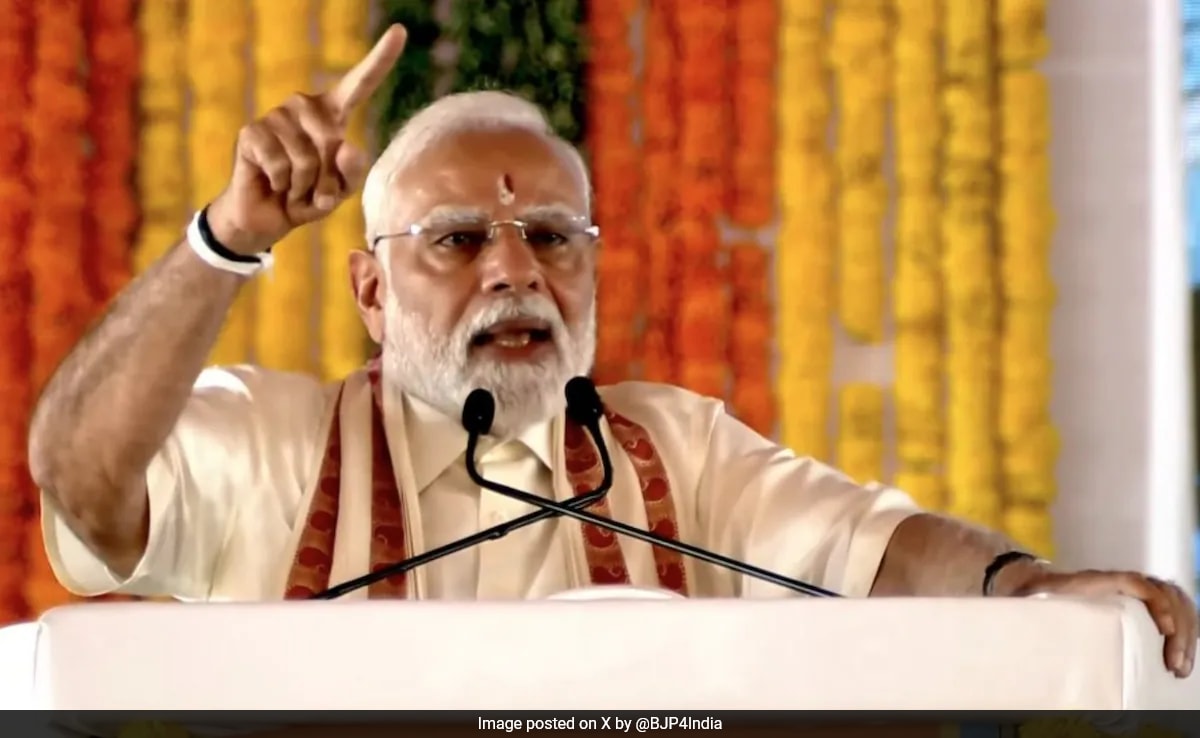Prime Minister’s Jibes Over Central Funding Draw Reactions from Tamil Nadu
In a recent event marking the inauguration of the Pamban bridge in Tamil Nadu, Prime Minister Narendra Modi took a moment to address the ongoing criticisms from the state’s Chief Minister, MK Stalin. During his speech, PM Modi used a metaphor to criticize the opposition, stating that some “cry without any reason.” This remark came in light of CM Stalin’s grievances regarding the central government’s allocation of funds and the controversial three-language policy.
The backdrop of the Prime Minister’s remarks revolves around the substantial increase in funding for Tamil Nadu’s rail projects, which have reportedly surged nearly sevenfold since 2014. Addressing this issue, Modi highlighted that annual funding had increased from a mere Rs 900 crore to over Rs 6000 crore this year, challenging the opposition’s narrative regarding inadequate support from the central government. “The infrastructure of Tamil Nadu is a top priority for the government,” he stated, underscoring that substantial investments are being made into modernizing railway stations, including the significant site in Rameswaram.
This public address has put the spotlight on the ongoing tension between the central government and the Tamil Nadu state government led by the DMK. The Chief Minister has been vocal about his concerns, alleging that the central government is not only politically undermining the state through policies like delimitation but also infringing on cultural aspects with language directives. CM Stalin contends that the allocation of funds is dependent on adherence to the National Education Policy, which he argues undermines the state’s linguistic heritage.
In a broader context, PM Modi’s speech emphasized the accomplishments under the Pradhan Mantri Gram Sadak Yojana, stating that over the past decade, approximately 4,000 km of roads have been constructed across the state. The Prime Minister’s comments appeared aimed at mitigating the opposition’s narrative that Tamil Nadu is being sidelined by the central government.
Political Dynamics: A Tense Stand-off Between Government and Opposition
The political relationship between the central government and Tamil Nadu has been fraught with challenges. CM MK Stalin cited concerns regarding the delimitation of parliamentary constituencies and the potential reduction of Tamil Nadu’s representation in the Parliament. He stressed the importance of protecting the current ratio of Members of Parliament (MPs) from states that have managed to control their population growth. In his absence from the Pamban bridge inauguration event, Stalin inaugurated a government-run medical college in the Nilgiris district, signaling his intention to focus on local governance issues.
Stalin has previously accused the central government of manipulating the political landscape to benefit northern states, which has fueled the growing discontent among southern states. The call for constitutional amendments to ensure adequate representation was a recurring theme in Stalin’s discourse, as he addressed the concerns of his constituents regarding state autonomy and central overreach.
Despite facing these challenges, PM Modi’s government has remained steadfast in its commitment to invest in Tamil Nadu’s infrastructure, as evidenced by the recent financial allocations. However, the BJP’s struggle to gain a foothold in Tamil Nadu is notable, as the party has failed to secure any seats in the last two general elections. As the BJP seeks to expand its political influence in southern states, the dynamics between these two political parties will undoubtedly shape the future of Tamil Nadu’s governance.
Both parties seem to be navigating their positions carefully as the political landscape becomes increasingly complex. As per the report by Hindustan Times, the BJP appears to be eyeing new states for expansion, particularly as it adapts to the coalition politics that have emerged in the aftermath of recent elections.
Public Reactions and Future Implications
The public response to PM Modi’s comments has been varied. Supporters of the Prime Minister argue that the substantial increase in funding for infrastructure is a clear indication of the central government’s dedication to regional development. Conversely, critics suggest that the Prime Minister’s remarks were dismissive of legitimate concerns regarding state representation and cultural policies.
The ongoing debate surrounding the three-language formula continues to be a sore point in Tamil Nadu, where the historical emphasis on Tamil has always been a matter of pride. The response from the public will likely influence how these political narratives evolve in the coming months, particularly as the state prepares for the next electoral cycle.
Moreover, as the Prime Minister continues to emphasize the importance of infrastructure and development in his addresses, the effectiveness of these strategies in winning over the Tamil electorate remains to be seen. The juxtaposition of central development projects against the backdrop of regional grievances highlights the intricate balance that must be struck to foster a cooperative political climate.
As PM Modi moves forward with plans for further investment in Tamil Nadu’s infrastructure, it will be critical for both state and central governments to engage in dialogues that prioritize the concerns of the local populace. The path ahead may require the bridging of cultural and political divides to ensure sustainable development that resonates with the aspirations of the people of Tamil Nadu.
For further reading on the infrastructure developments and political climate in Tamil Nadu, visit Financial Express and The Hindu. Additionally, for insights on broader political strategies employed by the BJP in southern states, refer to The Times of India.
DISCLAIMER
We have taken every measure to ensure that the information in this article and on our social media platforms is accurate, verified, and obtained from reliable sources. For feedback or complaints, please contact us at info@hamslive.com.


